This year’s theme for Black History Month is “Reclaiming Narratives,” which is shining a brighter light on the untold stories and achievements of Black individuals. This includes recognising and correcting the narratives of Black history and culture. In the UK, we often don’t hear enough about the outstanding achievements made by Black researchers in medical science. So, in keeping with this year’s Black History Month ethos, we’ve highlighted almost 40 Black scientists, both past and present, who have made significant contributions to medical science.
By LMS Staff Member
October 3, 2024
Time to read: 12 minutes
Professor Treena Arinzeh – Known for her work on stem cells, Professor Arinzeh is a biomedical engineer at Columbia University. Her work has shown that one person’s stem cells can be implanted to another without causing an immune response and has found a method for using stem cells in the regeneration of bone and repair of tissue damage.
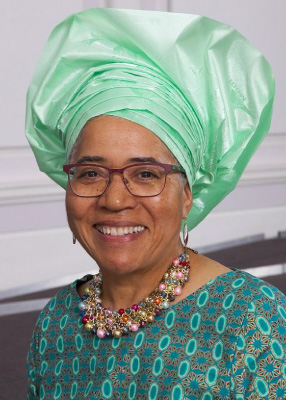
Dame Elizabeth Anionwu – In 1979, Dame Aniuowu became the UK’s first sickle-cell and thalassemia nurse specialist. She went on to set up the Mary Seacole Centre for Nursing Practice at the University of West London.
Alice Ball – Ball developed a novel method to make chaulmoogra oil, vastly improving the health outcomes of people with leprosy. Chaulmoogra oil is a treatment for leprosy but the raw oil from the seeds is unsuitable for application. While working at the University of Hawaii in 1915, at 23, Ball discovered a method for improving the solubility of the oil, allowing for injection.
Dr Patricia Bath – An American ophthalmologist and laser scientists, in 1986 Dr Bath invented a new device to remove cataracts using laser ablation. Dr Bath spent a considerable portion of her career engaged in humanitarian work, travelling the world to provide free eye care to underserved populations.
Dr Raven Baxter – Also known as Raven the Science Maven, Dr Baxter is an American science communicator who has worked to combat misinformation surrounding COVID-19. Recently, she has set up The Science Haven, a charity aimed at making science engageable and approachable to everyone.
Otis Boykin – An American inventor and engineer, Boykin is best known for the development of a number of electronic control devices, including a control unit for pacemakers.
Professor Emery N Brown – Trained as both a computational neuroscientist and anaesthesiologist, Professor Brown has been involved in a range of discoveries. His statistical work was critical in showing that the human circadian rhythm can be affected by lighting and is closer to 24 hours than 25. He later focussed his statistical work on deciphering brain signals. His group at the Massachusetts Institute of Technology (MIT) has also worked on understanding the mechanism underlying general anaesthesia.
Alexa Canady – Canady became the first Black woman to become a neurosurgeon in the US in 1981. Canady chose paediatric neurosurgery for her specialty and became well known for her patient focussed care. Her research contributed to the development of a device to treat the dangerous build-up of fluid on the brain (hydrocephalus).
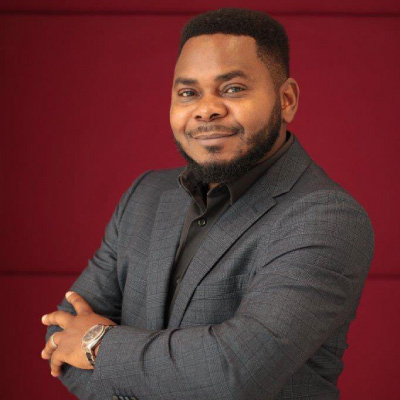
Dr Novel Chegou – Dr Chegou is a Cameroonian immunologist whose work has focused on the development of a testing platform for tuberculosis. His group also looks at how the microbiome impacts the disease progression of tuberculosis.
Dr Jewel Plummer Cobb – Dr Cobb is known for her work into the use of methotrexate. In the early 50s, while working at Harlem Hospital, she discovered that methotrexate was an effective treatment for childhood leukaemia in addition to a range of skin and lung cancers.
Dr Jane Cooke Wright – A renowned surgeon and cancer researcher notable for her contributions to chemotherapy. In 1949 she started at the Cancer Research Foundation at Harlem Hospital in the US, where she developed the technique of testing potential drugs on human tissue instead of laboratory mice, as well as pioneering the use of methotrexate to treat both breast and skin cancer.
Dr Kizzmekia Corbett – Dr Corbett started working on the development of novel vaccines for severe acute respiratory syndrome (SARS) in 2014. When the COVID-19 pandemic began she started working on a COVID-19 vaccine. Dr Corbett’s prior research suggested that mRNA encoding the spike protein of COVID-19 could be used to elicit an immune response in patients. Her team at Harvard University in the US worked with Moderna to develop the Moderna mRNA vaccine. For her work she was named in Time’s “Time 100 Next” list.
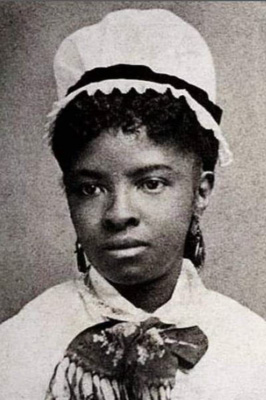
Dr Rebecca Lee Crumpler – The first African American woman to become a Doctor of Medicine in the US. In 1883 she published A Book of Medical Discourse which provided information on treating disease in infants, young children and women of childbearing age.
Dr Marie M Daly – The first African American woman to receive a PhD in Chemistry in the US in 1943. Her work was instrumental in understanding the relationship between high cholesterol and clogged arteries.
Dr Charles Richard Drew – The father of the blood bank, Drew was an American surgeon who carried out extensive research in the field of blood transfusions. Drew developed techniques for improved blood storage, and then used this expertise to create large scale blood banks to help in the care of the injured during World War II. Drew also fought against the segregation of blood donations, resigning from his position with the American Red Cross in protest in 1942.
Professor Jacqueline Dunkley-Bent – Professor Dunkley-Bent was appointed England’s first Chief Midwifery Officer when the position was first created in 2019. In 2023, she stepped down from this role to take up a leadership position at the International Confederation of Midwives (ICM). She is currently a visiting professor of midwifery at King’s College London and London South Bank University. She was included in the Nursing Times Leaders 2015 list for her contributions to nursing and healthcare.
John Edmonstone – A formerly enslaved man, Edmonstone was a taxidermist who is thought to have taught Charles Darwin the skill of taxidermy. During his time in Edinburgh, Edmonstone taught taxidermy to the students from the University of Edinburgh, including Darwin. Having worked in hot countries, he was able to preserve animals quickly in the heat, a skill important for Darwin’s study of the finches.
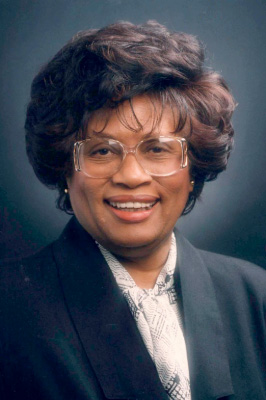
Dr Jocelyn Elders – The first African American woman to serve as the Surgeon General of the US from 1993 to 1994. Dr Elders was a strong proponent of sexual health education and contraception. While working as Surgeon General, Dr Elders advocated for better education around sexual health and the distribution of contraceptives in schools.
Professor Segun Fatumo – A Chair of Genomic Diversity at Queen Mary University of London and the head of non-communicable diseases (NCD) Genomics at the MRC Uganda. He specialises in genomics and other omics of African populations using approaches such as genome-wide association studies (GWAS), polygenic risk score analysis and Mendelian randomisation. He co-led the first major GWAS of cardiometabolic traits in Africa and led the first GWAS of kidney functions in continental African populations.
Dr Solomon Carter Fuller – Dr Fuller was a neuropathologist from Liberia, instrumental in our current understanding of Alzheimer’s Disease. In 1911 Fuller was the first to suggest that amyloid plaques and neurofibrillary tangles could be significant biomarkers for the study of Alzheimer’s. It has been said that his contributions to our understanding of the disease were so significant that were it not for the insistence of the esteemed psychiatrist Emil Kraepelin that it be named after his student Alois Alzheimer, the disease would have been named after Dr Fuller.
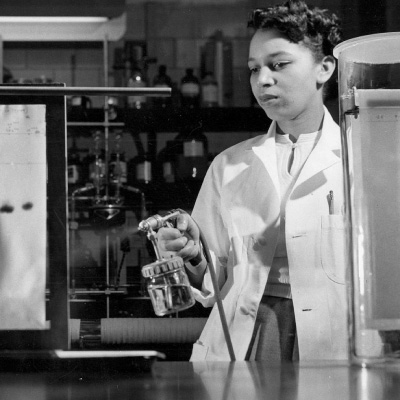
Alma Levant Hayden – Potentially the first African American scientist to work in the US Food and Drug Administration (FDA) after being hired in the 1950s, Hayden was an expert in spectrophotometry. Her work showed that the alternative cancer medication Krebiozen was actually just creatine, proving that the expensive scam was not a real anti-cancer therapeutic.
Professor James E K Hildreth – One of the most influential HIV researchers in the world, Dr Hildreth’s lab identified the adhesion protein LFA-1 as playing a direct role in HIV infection. He has published extensively on HIV and also worked with Black churches in the south of the US to educate Black communities about HIV.
Dr Jane Hinton – Dr Hinton co-developed Mueller-Hinton agar in 1941 which is still commonly used for antibiotic susceptibility testing. She then went on to become the joint first African American woman to be awarded a Doctor of Veterinary Medicine degree in 1949.
Dr William Augustus Hinton – The child of formerly enslaved parents, Dr Hinton graduated from Harvard Medical School in 1912. After medical school, he became an expert in syphilis developing the Hinton test to accurately test for the disease. Alongside his public health work, Hinton also worked to combat the stigma around syphilis, emphasise the role that socioeconomic standing plays in health and publish the first medical textbook by a Black American.

Dr Janina Jeff – Population geneticist and podcaster, Dr Jeff is the producer and host of the In Those Genes podcast. The podcast links Black identity and genetics. In 2020 the American Society of Human Genetics awarded her the Advocacy award for her podcast.
Dr Percy Lavon Julian – In 1931 Dr Julian became the third African American to achieve a PhD in chemistry. Dr Julian’s research into the synthesis of hormones from natural starting materials allowed for the largescale use of steroid based drugs. These drugs range from cortisone to the birth control pills and to chemotherapies.
Dr Farah D Lubin – The Lubin Lab at The University of Alabama at Birmingham explores the epigenetic mechanisms that underlie cognition, particularly in disease states such as epilepsy and neurodegeneration. Her work has uncovered the role of NF-kB in fear memory consolidation as well as the role of a protein called brain-derived neurotrophic factor (BDNF) in long-term memory formation.
Dame Donna Kinnair – Dame Kinnair was the Chief Executive and General Secretary for the Royal College of Nursing from 2019 through to 2021. In addition to nursing, she also holds qualifications in medical law and ethics, which she used to improve child protections, particularly in South London.
Dr Miles Vanderhurst Lynk – Devoting much of his time to creating opportunities for other African Americans in science, Dr Lynk established the Medical and Surgical Observer – the first medical journal published for African American practitioners in1892.
Mary Eliza Mahoney – The first African American to work and be professionally trained as a nurse in the US, Mahoney was passionate about improving the lives of other nurses from racially minoritised backgrounds. In 1908, she founded the National Association of Colored Graduate Nurses to advocate for their rights.
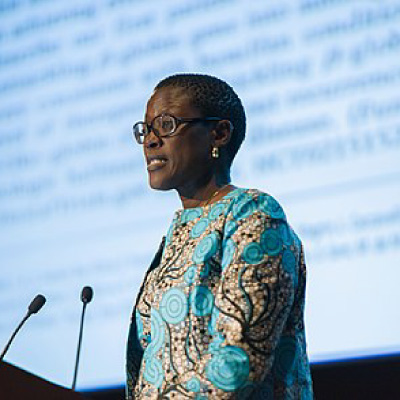
Professor Julie Makani – Tanzanian born Professor Makani received the Royal Society Pfizer Award for her work with sickle cell disease. One of her current aims is to use sickle cell disease as a model to establish scientific and healthcare solutions in Africa that are locally relevant and also have global significance. She is also a Provost Visiting Professor at Imperial College London.
Professor Ruth Ella Moore – The first African American woman to be awarded a PhD in Natural Sciences in 1933, Professor Moore’s work ranged from dental cavities to blood types to the impact of antibiotics on the gut microbiome. Her work on the microbiome is considered some of the earliest work in the field.
Dr Olufunmilayo Olopade – The Director of the Center for Clinical Cancer Genetics at the University of Chicago Medicine Comprehensive Cancer Center in the US, Nigerian-born Dr Olopade has contributed to our understanding of the differences in how Black and White women are impacted by breast cancer. Her research has shown that Black women often developed breast cancer at a younger age and their tumours are more likely to not require oestrogen to grow.
Dr James McCune Smith – Dr Smith attained a medical degree in 1835 in Glasgow, becoming the first African American to do so. He later moved back to New York and set up the first African American-run pharmacy in the country. Alongside his medical career, Dr Smith advocated for African Americans, using his medical training to refute common racial stereotypes.
Dr Kimberly Smith – Dr Smith is at the forefront of finding a cure for HIV/AIDS and is the Head of Research and Development at the pharmaceutical company, ViiV Healthcare. She started her career as a clinician in Chicago at the height of the AIDS epidemic and was one of the first to examine the impact of gender and racial disparities within the HIV community.
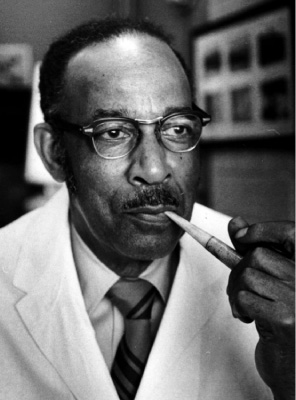
Dr Vivien Thomas – Dr Thomas received very little formal education beyond high school yet was instrumental in the development of the Blalock-Thomas-Taussig shunt, a procedure developed in 1943 to treat a condition in babies caused by low oxygen in the blood known as cyanotic heart disease. This was part of his work as surgical laboratory supervisor, for which he received an honorary doctorate from the John Hopkins School of Medicine.
Samantha Tross – The first woman of African Caribbean descent to become an orthopaedic surgeon in 2005. She has been included in the Black Powerlist of the 100 most Influential Britons since 2009.
Dr George Warimwe – Dr Warimwe’s work is focused on the transmission of disease between animals and humans with an emphasis on the development of vaccines to control their spread. His Kenya-based lab has previously worked on both Rift Valley Fever and Middle East Respiratory Syndrome.
Daniel Hale Williams – In 1891 Williams founded Provident Hospital, the first non-segregated hospital in the US. Provident Hospital provided training residencies for doctors and a training school for nurses. While these programmes were aimed at Black healthcare professionals, the staff and patients at Provident Hospital were integrated from the start. At Provident Hospital, Williams performed the first successful heart surgery on record without the use of antibiotics or blood transfusions.